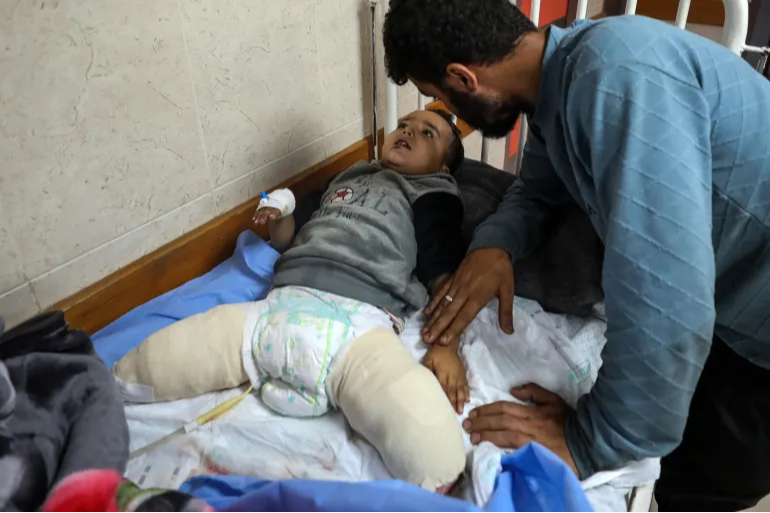
Gaza City, November 22 (RHC)-- At Deir el-Balah, in the intensive care unit of Al-Aqsa Martyrs Hospital, the little boy locks his eyes on his uncle’s face. “Juice,” he says.
His maternal uncle, Ibrahim Abu Amsheh, complies, leaning forward to carefully insert the straw in the little boy’s mouth. That was one of the rare words that the little boy, three-year-old Ahmad Ibrahim Shabat, has said since his legs were blown off in an Israeli air attack on Monday.
His uncle Ibrahim said Ahmad is not fully aware of what has happened to him. “He doesn’t know he lost his legs,” the 28-year-old said. “He keeps asking to go outside for a walk.
“He’s in a lot of pain, and the hospital only has Acamol [paracetamol], which you take if you have a headache not if you’ve lost both your legs.”
Ahmad is one of the earliest victims of the Israeli offensive on the Gaza Strip. His family’s home in the northern town of Beit Hanoon was directly targeted by an air raid on the first day of Israel’s assault, killing his entire family except his two-year-old brother, Mahmoud.
“I had called my sister Diana’s house, and she told me they were getting ready to leave,” Abu Amsheh recalled. “As soon as I hung up, we heard that her house had been targeted, killing all of them. Ahmad’s parents, older brother Mohammed, his grandparents, his uncles and aunts. All gone.”
When Ibrahim went to Beit Hanoon to bury his family, he found out from neighbors that Ahmad had been taken to the Indonesian Hospital, alive.
“The force of the blast threw him in the air and he landed in one of the neighbour’s yards,” Ibrahim said. “I took him back with me to Sheikh Radwan, where I had evacuated to with my family.”
But a day later, they were forced to move again, after a house right next door to where they were staying was bombed. Spooked, they went to a United Nations-run school in the al-Nasr neighborhood, but barely spent a night there before they were displaced for the third time.
“That morning, the Israeli military dropped leaflets on us saying that the school was not safe and for us to evacuate,” Ibrahim said. “So we went to another UN school called Abu Oreiban in Nuseirat refugee camp.”
They spent a month at the school, and Ahmad grew very close to his other uncle Saleh, Ibrahim’s younger brother. “Ahmad was very attached to Saleh, and the previous attacks made him cling to his uncle even more,” Ibrahim said. “He would wake up screaming and only be comforted by Saleh, who was going to be his legal guardian.”
Then came November 13. Ahmad wanted to go to the shop with Saleh. As they walked out of the school, a series of explosions rocked the area. Ibrahim, still in the school, was among those who helped everyone run inside the classrooms to avoid being hit by shrapnel, until he realised his brother and nephew were outside the school.
“I ran out to see what happened to Ahmad and Saleh, and I saw Ahmad on the ground without his legs,” Ibrahim said. “I carried him in my arms and ran until an ambulance picked us up.”

At al-Awda Hospital, the doctors gave the little boy basic treatment before referring him to Al-Aqsa. Ibrahim looked among the wounded for his brother, but couldn’t find him. With dread mounting inside of him, he asked where the morgue was.
“I unwrapped the shroud from the body closest to me and saw his face,” he said, as he started sobbing quietly. “Saleh was still young, only 26 years old. He had just gotten engaged. We buried him at sunset.”
In the hospital in Deir el-Balah, Ahmad spent three hours on the operating table. Dr Ahmad Ismail al-Zayyan, the orthopaedic surgeon who administered his case, said he arrived in terrible shape, with both legs severed from above the knee.
“We’ve seen from other cases of amputee children, some of whom survived and others who did not, that the type of weapons used by Israel has melted bones and connective tissue,” al-Zayyan said.
In the long run, Ahmad’s troubles are far from over, al-Zayyan said, and his biggest struggle may be getting fitted properly for prosthetics. “His balance will also be affected since the amputation is above the knee,” he said. “And he’ll have muscle atrophy because his body still has a lot of growing to do.”
Al-Zayyan said he hopes Ahmad will get the care he needs outside Gaza. “We don’t have the resources for prosthetic parts in the Gaza Strip,” he said. “We also lack surgical instruments and anaesthesia.”
In the ICU, Ahmad lies on his back, what remains of his legs heavily bandaged and splayed. Ibrahim, who has a one-and-a-half-year-old daughter himself, watches him tenderly.
“This boy has experienced so much,” he said. “Ahmad survived, but he is practically like the living dead. He’s barely had time to recover from the attack on his home that killed his family.”
Ahmad was a cheeky boy and loved to play, but now he is riddled with pain and fear. He used to ask for his mother but doesn’t anymore. “We tell him his mother loves him very much and that she’s in heaven now,” Ibrahim said, tears running down his face into his black beard.
“I wouldn’t wish on anyone what we’ve been through.” The uncle, who will raise Ahmad as his own son, hopes the child will be able to have a semblance of a normal life. “He had barely started nursery,” Ibrahim said.
“I know he won’t be the same boy he was before all of this began, but I just want him to have as normal a life as possible. I implore anyone who can to help us get him prosthetics so he can live like other children.”

